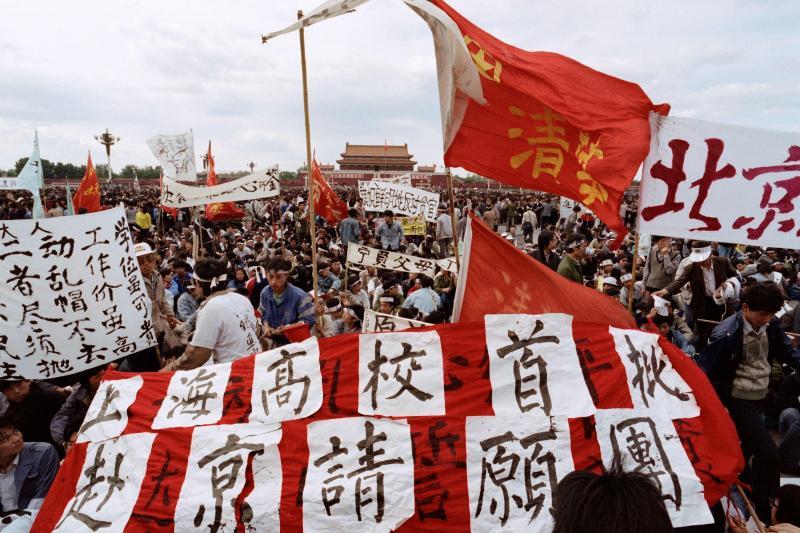President William Lai (賴清德) today commemorated the 36th anniversary of the Tiananmen Square Massacre on social media, underscoring the importance of defending democracy and freedom.
"Every year on June 4, Taiwanese society lights candles of remembrance grounded in the universal values" shared among democracies, Lai said, adding that doing so was "not only about commemorating the history, but also about preserving the memory" of the incident.
As authoritarian regimes erase history, democracies "have a duty" to preserve it, he said.

Photo: AFP
Criticizing China without naming it, Lai also warned that 36 years on, the threat of authoritarianism by military intimidation, “gray zone” coercion, surveillance and extraterritorial repression remain a global challenge to democratic societies.
Taiwan stands on the frontlines of defending democratic values worldwide, he said, adding that it would continue working with like-minded partners to "safeguard the status quo" and protect democracy and freedom.
Taiwan endured decades of authoritarian rule before transitioning to democracy, a process made possible by the sacrifices and efforts of countless pro-democracy advocates, Lai said.
"We deeply understand the value of freedom and must not ignore the threats posed by authoritarian expansion to global democracy and the rule of law," he said.
In a Facebook post today, Premier Cho Jung-tai (卓榮泰) said that “June 4, 1989, has become a taboo topic in China, while Taiwan has taken the opposite path by cultivating the soil of democracy and sowing the seeds of freedom.”
Since 1989, Taiwan has seen eight direct presidential elections and three peaceful transitions of power, “showing the world Taiwan’s pursuit of freedom and willingness to protect democracy,” he said.
Citizens freely exercise the rights guaranteed to them in the Constitution with the ability to publicly criticize the government without worrying about government oppression, he said, adding that “this is a right the Chinese people have not had for 36 years.”
Meanwhile, the Democratic Progressive Party paid tribute to those who have fought for democracy from the past to the present.
“Standing in a free land, June 4 reminds Taiwanese society that totalitarianism is not far away,” the party said, adding that it has a responsibility to record history and warn of the Chinese Communist Party’s authoritarianism.
“We will continue to strengthen national defense and economic resiliency and cooperate with friendly international partners, working together and safeguarding peace and democracy in Taiwan,” it said.
The Chinese Nationalist Party (KMT) said that today is a day to remember the difficulties of fighting for freedom and democracy.
“People must stand up in the face of dictatorship,” the KMT said in a Facebook post.
“The pursuit of freedom has never been eliminated in the hearts of Chinese people around the world. The KMT will never forget this history and will continue to fight for their democracy and freedom,” it said.
The Constitution enables the Republic of China to “serve as a beacon of democracy” for Chinese and the world at large, the party added.
In the early hours of June 4, 1989, peaceful Chinese student protesters who had gathered at the Tiananmen Square in Beijing to call for political reform were brutally cracked down on by Chinese troops under orders from then-Chinese leader Deng Xiaoping (鄧小平).
The number of deaths from the incident — which remains a sensitive and heavily censored topic in China — is estimated to range from several hundred to potentially more than 1,000, although some sources suggest the toll may have been higher.

ECHOVIRUS 11: The rate of enterovirus infections in northern Taiwan increased last week, with a four-year-old girl developing acute flaccid paralysis, the CDC said Two imported cases of chikungunya fever were reported last week, raising the total this year to 13 cases — the most for the same period in 18 years, the Centers for Disease Control (CDC) said yesterday. The two cases were a Taiwanese and a foreign national who both arrived from Indonesia, CDC Epidemic Intelligence Center Deputy Director Lee Chia-lin (李佳琳) said. The 13 cases reported this year are the most for the same period since chikungunya was added to the list of notifiable communicable diseases in October 2007, she said, adding that all the cases this year were imported, including 11 from

Prosecutors in New Taipei City yesterday indicted 31 individuals affiliated with the Chinese Nationalist Party (KMT) for allegedly forging thousands of signatures in recall campaigns targeting three Democratic Progressive Party (DPP) lawmakers. The indictments stem from investigations launched earlier this year after DPP lawmakers Su Chiao-hui (蘇巧慧) and Lee Kuen-cheng (李坤城) filed criminal complaints accusing campaign organizers of submitting false signatures in recall petitions against them. According to the New Taipei District Prosecutors Office, a total of 2,566 forged recall proposal forms in the initial proposer petition were found during the probe. Among those

The Mainland Affairs Council (MAC) today condemned the Chinese Communist Party (CCP) after the Czech officials confirmed that Chinese agents had surveilled Vice President Hsiao Bi-khim (蕭美琴) during her visit to Prague in March last year. Czech Military Intelligence director Petr Bartovsky yesterday said that Chinese operatives had attempted to create the conditions to carry out a demonstrative incident involving Hsiao, going as far as to plan a collision with her car. Hsiao was vice president-elect at the time. The MAC said that it has requested an explanation and demanded a public apology from Beijing. The CCP has repeatedly ignored the desires

The Ma-anshan Nuclear Power Plant’s license has expired and it cannot simply be restarted, the Executive Yuan said today, ahead of national debates on the nuclear power referendum. The No. 2 reactor at the Ma-anshan Nuclear Power Plant in Pingtung County was disconnected from the nation’s power grid and completely shut down on May 17, the day its license expired. The government would prioritize people’s safety and conduct necessary evaluations and checks if there is a need to extend the service life of the reactor, Executive Yuan spokeswoman Michelle Lee (李慧芝) told a news conference. Lee said that the referendum would read: “Do